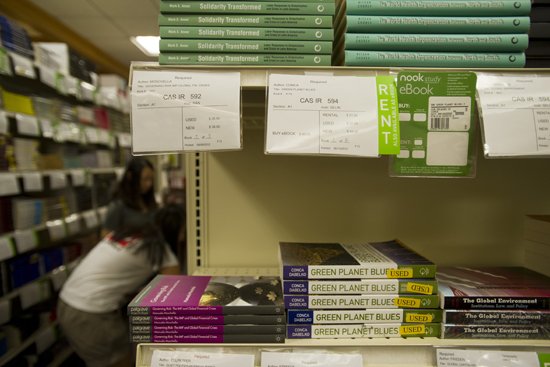How to Save on Textbooks
To buy, rent, or download, that is the question

Last year, BU students spent $1 million less than they did the previous year on textbooks at Barnes & Noble at BU, largely because of rental and digital options. Photo by Cydney Scott
While the cost of a college education continues to rise, there is some good news about student expenses: a survey released in July by the National Association of College Stores found that college students are spending slightly less on textbooks and study guides than they did in 2009, and nearly $50 less than they did in 2007. The students surveyed reported spending an average of $655 for course materials in 2011, down from the $702 they spent in 2007.
The majority of students interviewed by BU Today say they don’t think they are spending less, but they do say they are renting at least some of their textbooks. And that trend is paying off. Steve Turco, general manager of Barnes & Noble at BU, says that last year alone, BU students spent $1 million less than they did the previous year, largely because renting books can save 50 percent or more. Turco says that savings is augmented by the availability of digital textbooks, which cost about a third less than standard textbooks.
“Our rental sales last year increased at a far greater percentage than our overall textbook sales,” he says. “Students are clearly shifting their textbook purchases from new or used books to rentals.”
Approximately 60 percent of Barnes & Noble textbooks can now be rented, Turco says, up from 30 percent two years ago, when the bookstore first introduced the option. Ditto for digital textbooks: approximately 40 percent of the book list for BU courses is now available as an e-book at B&N, up from 12 percent two years ago. To find out if a specific book is available for rent or in digital form, check the bookstore’s website, searching by course number.
Turco says students often operate under the assumption that if they buy a book new and sell it back at the end of the semester, they’ll save more than by renting. But the price of a buyback depends on factors like the condition of the book, he says, and whether the course is being taught the following semester. Students could end up with as little as 10 cents on the dollar with a buyback.
“I usually rent books that I don’t think I will use again, but I do buy books like my public relations book and ones that I think I may use later in my career,” says Jack Goldberg (COM’13).
Sites like Amazon, Half.com, and Chegg have also become increasingly popular with budget-conscious shoppers. A recent comparison using two popular textbooks shows why. A new copy of Life: The Science of Biology listed for $206.65 at Barnes & Noble. The same book could be found new at Amazon for $193.75, at Chegg for $155.99, and at Half.com for $129.88. Similarly, a popular international relations textbook—From the Twentieth-Century World to Today: An International History Since 1900—listed for $74.95 new at Barnes & Noble, $50.49 at Chegg, $49.95 at Amazon, and $40.99 at Half.com. Those sites also offer many titles in digital format for purchase and rental, as well as used textbooks.
A few things to consider before buying or renting any textbook. If you’re renting, make sure that the rental period extends through the entire semester. (Barnes & Noble at BU’s does, but that’s not true for all websites.) If you’re renting a book from an online vendor, read the small print. Each site has different stipulations on what kinds of marking and highlighting it allows before deciding a book is too damaged to take back. For example, Amazon clearly states that renters will be charged the full purchase price of their rented book if it’s returned with water damage, a broken spine or binding, a torn or taped cover, missing, torn, or loose pages, strong odors of any kind, or “excessive writing or highlighting.” If you’re someone who likes to mark up a book, renting probably isn’t your best option.
Turco advises anyone who’s considering renting a book from an online vendor to read the “very fine print” on how to return the book. “If you don’t use their preapproved shipping process, they may not accept your textbook rental returns,” he says.
Buying a used textbook at Barnes & Noble at BU versus online allows you to examine the condition of the book before you plunk down your credit card. If you buy a used book online and it arrives in poor condition, mailing it back to the buyer and finding another purchase source can take time. If you need the book later that week, that could cause problems. So if you’re purchasing online, get your orders in early.
If you’re renting or buying an e-book—again, read the small print. Make sure the digital textbook you’re getting is compatible with your reader. And you may need specific software. If you buy or rent an e-book from Barnes & Noble at BU, you’ll have to download the chain’s free NOOK learning app, which allows highlighting, note sharing, and hyperlinks to related websites. You can currently download it to either your PC or your Mac, and it will soon be available for use on iPads.
Despite the savings that online sites can offer, many students say the convenience and service offered at Barnes & Noble at BU (including multiple payment plans) can’t be beat. “It’s reassuring to know that the Barnes & Noble at BU bookstore will package up everything I need and I can pick it up in one fell swoop,” says Sophie Miller (CAS’14).

Comments & Discussion
Boston University moderates comments to facilitate an informed, substantive, civil conversation. Abusive, profane, self-promotional, misleading, incoherent or off-topic comments will be rejected. Moderators are staffed during regular business hours (EST) and can only accept comments written in English. Statistics or facts must include a citation or a link to the citation.